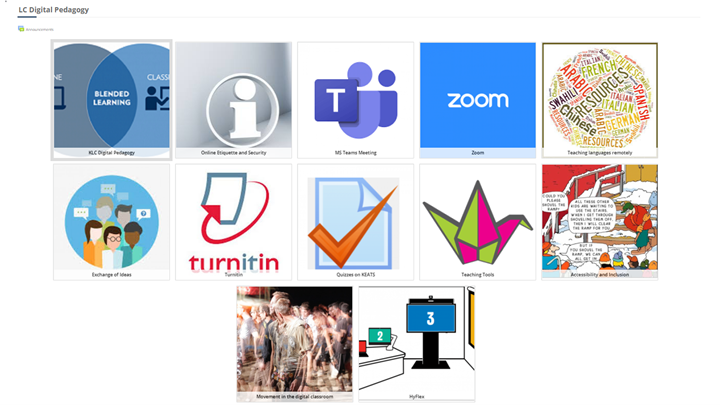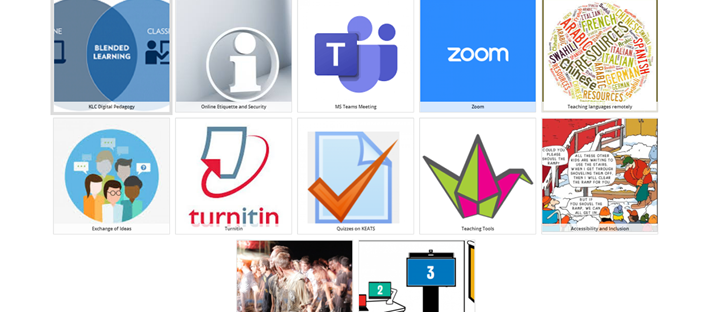A holistic approach was adopted by the King’s Language Centre (LC) to comply with the legal requirements of accessibility. The Senior Leadership Team (SLT) has been instrumental in driving the change not only with the academics, but also with members of the Professional Service team (PSS). The approach combined top-down and bottom-up strategies that have been successful in improving all our digital resources, including KEATS pages, educational materials, and templates for essential documentation.
To promote the use of the Digital Accessibility Baseline a link to the course on KEATS was included in the LC Keats space created at the beginning of the pandemic for Digital Pedagogy, in the section dedicated to Accessibility and Inclusion. The section contains useful materials such as KEATS and PowerPoint accessibility check lists, KCL digital accessibility best practice, etc.
The Digital Accessibility Baseline course standards and the curated guidance were developed by the Digital Education Accessibility Task-and-Finish Group in consultation with academic staff, Technology Enhanced Learning staff, and students, and we are embedding it in our training.


The importance of digital accessibility was rapidly embraced by the department, thanks to the efforts of Tanya Linaker, our Diversity and Inclusion Lead. The acquisition of the Blackboard Ally software by the Centre for Technology Enhanced Learning (CTEL) was well received by all the Language Centre (LC) members. Two initial sessions of training to use the software were delivered by David Busson-Crowe (CTEL). Members of the Senior Leadership Team (SLT) were active participants as well as Team Leaders and Deputy Team Leaders, who passed on the information to the members of their teams regarding the use of Blackboard Ally and other resources to improve digital accessibility.
The following actions were taken: pre-training auditing of KEATS pages, in-house training sessions and surgery hours to help lecturers fix existing resources and to check that all new resources had no accessibility issues. A spot check of the KEATS pages showed a considerable improvement in terms of the accessibility using Blackboard Ally gauge as an indicator.
We also provided support to the professional service team giving them access to guidelines and templates developed by CTEL. The PSS team has been working on fixing accessibility issues in all the templates used in our department.
The training provided also included how to design accessible PowerPoint presentations for teaching languages. The session covered colour contrast, balance, and collocation of the use of images and text to efficiently guide the audience’s attention.

A presentation of King’s Online Design System was given to staff members, who were able to see samples of colour combinations that they are advised to use in order to create accessible resources.
Materials and links from the in-house training and CTEL resources were placed in LC Digital Pedagogic space on KEATS.
We also requested IT to acquire OracleColor; a software that is now available to everyone in the Software Centre. This software allows to simulate how all webpages and resources are perceived by people with different types of colour blindness.
The spot-check of the accessibility of KEATS shows that although improvements have been made, some problems remain, especially with the legacy of PDF files. These files will be replaced in the coming months.
To summarise, we are pleased to report that LC staff are aware of the importance of the accessibility of all existing resources. Any new materials are designed with accessibility in mind. The LC has set the goal to make all its digital content accessible at the end of the first term of the next academic year.
Useful Links
King’s Online Design System:
Samples of colour combinations:
King’s Digital Education Accessibility Baseline:
Written by Cecilia Trevino
Cecilia Trevino works as a Technology Enhanced Learning Advisor at the Modern Language Centre. She studied Psychology and Journalism in Mexico and London and worked as a correspondent for several years before taking an MA in Applied Language Studies at University of Westminster. Her thesis looked at the impact of using technology enhanced materials in language learning. Since she joined King’s in 2004 she has been actively involved in TEL projects
